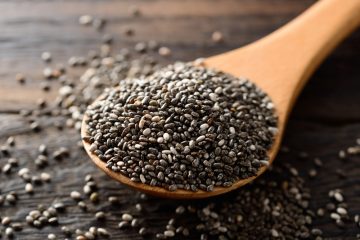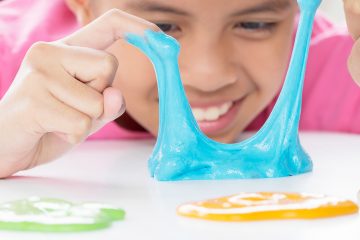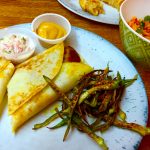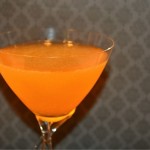Native Spring and Summer Blooms
Choosing the best native spring and summer blooms might seem impossible.
So we asked Tania Younkin of Nature Center at Shaker Lakes for some advice.
“Native flowers are one of North East Ohio’s greatest gifts and too often underappreciated and unknown,” Tania told us. “It can be difficult to choose but below are a few of my favorites.” Take some time to get out this spring and summer and explore our native plant species that work to keep our North East Ohio eco system thriving. Wildflower season varies year to year and changes daily – be sure to explore often so you don’t miss it!
Here are a small sampling of some of Tania’s favorites:
Trillium, below, is showy and sticks around a while. The large white trillium is even our state wildflower. There are several varieties, but some are rarer than others. Do not touch a trillium if you see one: picking any part of a trillium will kill in, and in fact it is illegal to pick in several states. You will see this midwinter into late spring.
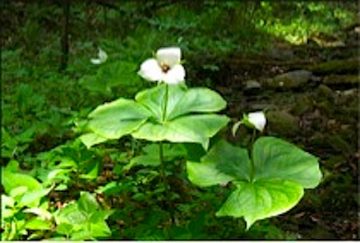
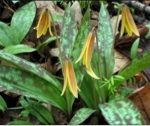
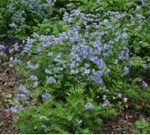 Yellow trout lily, left, is showcased by a small nodding flower – yellow inside, bronzy outside. Trout lily blooms in early spring before the trees growing above it develop leaves; this allows it to have full access to sunlight.
Yellow trout lily, left, is showcased by a small nodding flower – yellow inside, bronzy outside. Trout lily blooms in early spring before the trees growing above it develop leaves; this allows it to have full access to sunlight.
Jacob’s ladder, right, (Greek valerian) is a pleasant smelling native which blooms in April or May with dainty clusters of flowers which hang like bells from the long stems. Jacob’s ladder plants can be an excellent addition to a low maintenance garden and are deer tolerant.
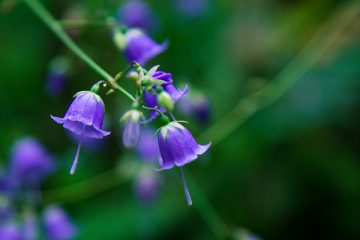
Virginia Bluebells
Virginia bluebells are often seen as a blue sea of flowers growing over floodplains near streams. The flower buds are pink and become blue as they open. Virginia bluebells bloom in early to mid-spring and will continue blooming through early to mid-summer.
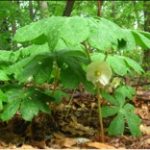
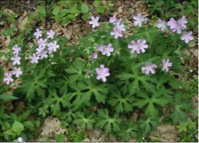
Wild geranium, left, is a perennial plant native to eastern North American woodlands. It flowers in spring to early summer, with five rose-purple petals.
Mayapple, right, blooms in early May (hence the name). With umbrella-like leaves, the bloom is typically white, red, or yellow and mature into a green, yellow or red fleshy fruit. The unripe green fruit is toxic. The ripened yellow fruit is edible in small amounts, but poisonous when consumed in large amounts.
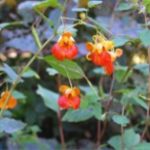
Jewelweed, right, is trumpet-shaped, with orange flowers hanging from the plant much as a jewel from a necklace. Blooming in May through October, it is known to be often found near poison-ivy.
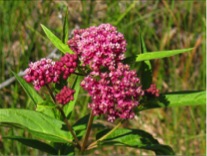
Swamp Milkweed
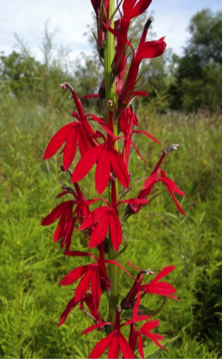
Red Cardinal Flower
Swamp milkweed has sap containing toxic chemicals which repels insects and other herbivorous animals. They bloom in early to mid-summer, producing small, fragrant, pinkish flowers in a number of short, rounded flower stalks. Monarch butterflies feed on the flowers and lay eggs on the plants.
The red cardinal flower blooms from May to October. These beauties have showy, red flowers resembling flaming red spires.
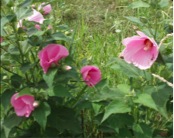 Swamp rose mallow, left, (native hibiscus) perhaps the showiest plant in the Nature Center marsh, is a tall plant with exotic, oversized pink flowers that are very striking, particularly when they occur in a colony. These have significant wildlife value for nectar-feeders such as bees and birds, and flower in late summer.
Swamp rose mallow, left, (native hibiscus) perhaps the showiest plant in the Nature Center marsh, is a tall plant with exotic, oversized pink flowers that are very striking, particularly when they occur in a colony. These have significant wildlife value for nectar-feeders such as bees and birds, and flower in late summer.
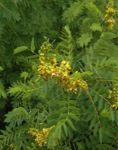
Wild Senna
Wild senna is listed as threatened or endangered in the northeast United States due primarily to habitat loss. This is a stunning plant in bloom and has attractive clusters of yellow flowers which form from July through August.
A later bloomer, the cup plant, below, flowers in July to September. These tall plants (4-10’) have bright yellow daisy shaped flowers that form the shape of a cup to catch rainfall and attract small birds such as goldfinches.
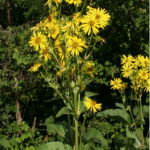
The Nature Center will have its on Sunday, May 13th for the Annual Plant Sale. Shop for not only for homegrown plants and natives, but also herbs, vegetables, perennials, annuals, hanging baskets and container assortments. Experts will be available throughout the day offering guidance in making great native selections for your garden.
Expand your backyard at the Nature Center at Shaker Lakes.
 About Tania Younkin
About Tania Younkin
Tania Younkin is the Director of Marketing at the Nature Center at Shaker Lakes. As a Cleveland transplant who grew up in Colorado, she enjoys the outdoors and has found passion in all the many outdoor activities that Cleveland and its surrounding area has to offer to fulfill her inner Colorado-girl. When Tania’s not in the garden, she can be found coaching and teaching swimming around the Heights, snow skiing, and hanging out with her husband Andrew and three daughters, ages 13, 10, and 4.
Shaker Chamber Orchestra is 3rd…in the NATION!
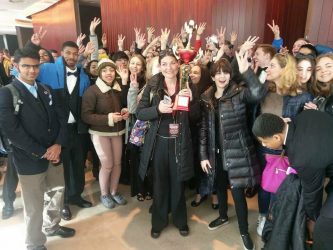 Try Our Cococut Green Smoothie
Try Our Cococut Green Smoothie
The Best Corned Beef in Cleveland
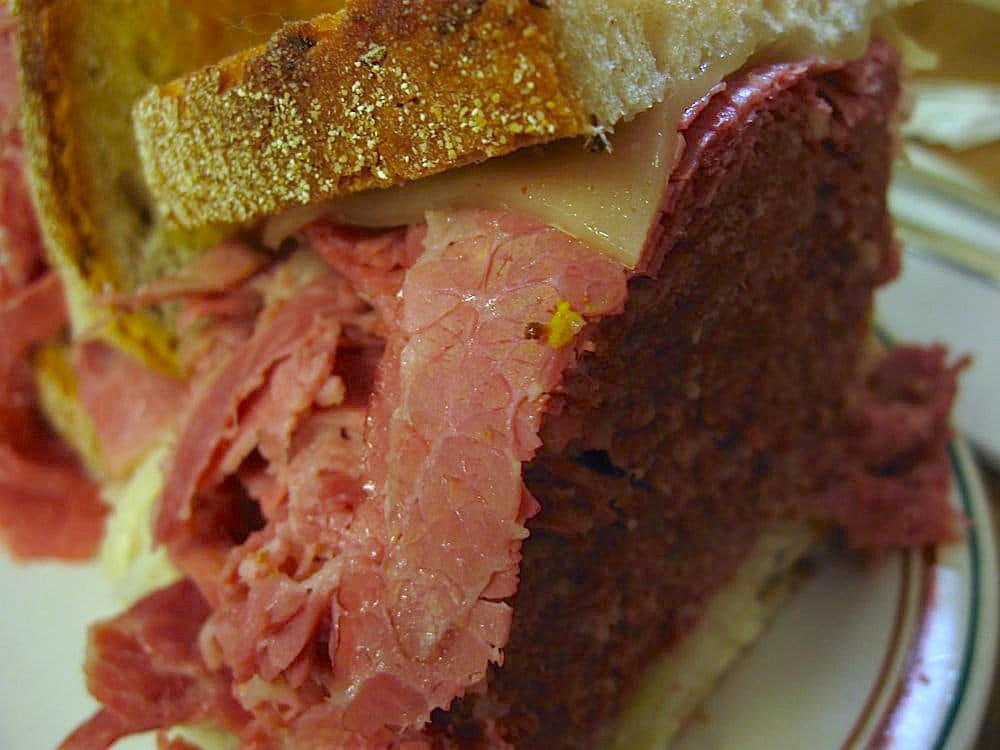
Our Favorite Ice Cream Experience in Cleveland
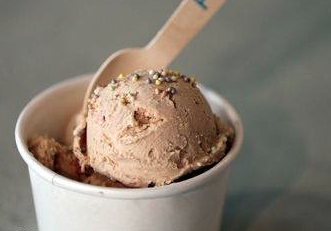
If You Love Ribs, You’re Going to Go CRAZY Over Ribsticks.
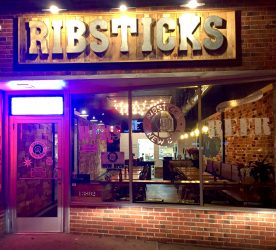
Teen and Alcohol: What You Should Know
BETTER DAD = BETTER SEX…Trust Us

Comfort Food: Warm Up with Shepherd’s Pie
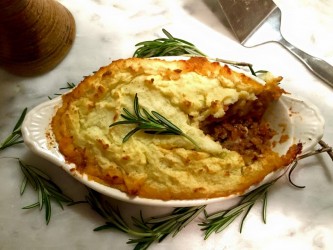
What Can Quinoa Do for Your Health?
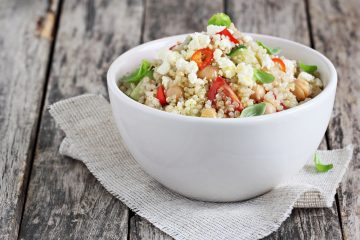
Delicious Roasted Asparagus and Mushrooms with Parmigiana Reggiano.
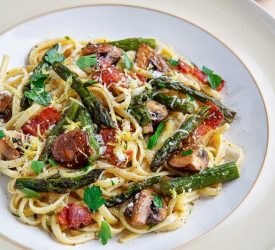
Why is Everyone Crazy About Kale?!
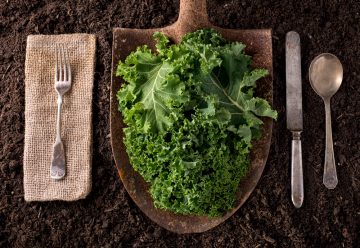
A Gooey, Juicy, Even a Bit Crunchy, Sloppy Burger You Will Love:
Nacho Burger

Calling All Ice-Cream Fanatics! Try Our Waffle Ice Cream Sandwich
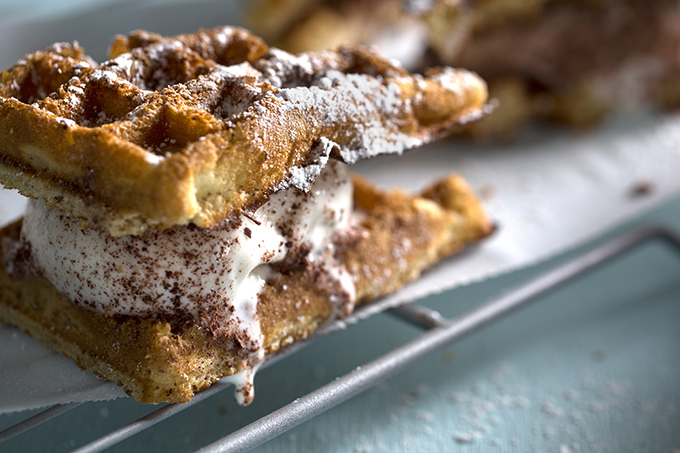
Fish So Good…You Won’t Even Realize How Healthy it is:
Zesty Creole Cod
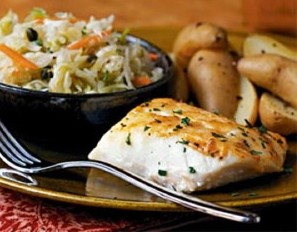
Delicious Roasted Asparagus and Mushrooms with Parmigiana Reggiano.

Something Comforting, But Not Too Heavy:
Pork Sage Meatballs.
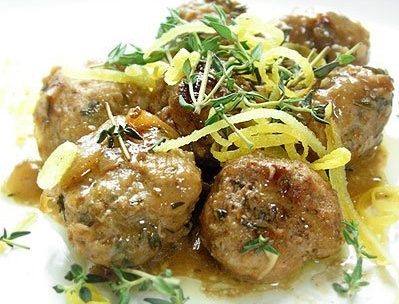
A Tiny Little Seed That Packs a Big Punch of Nutrition.
